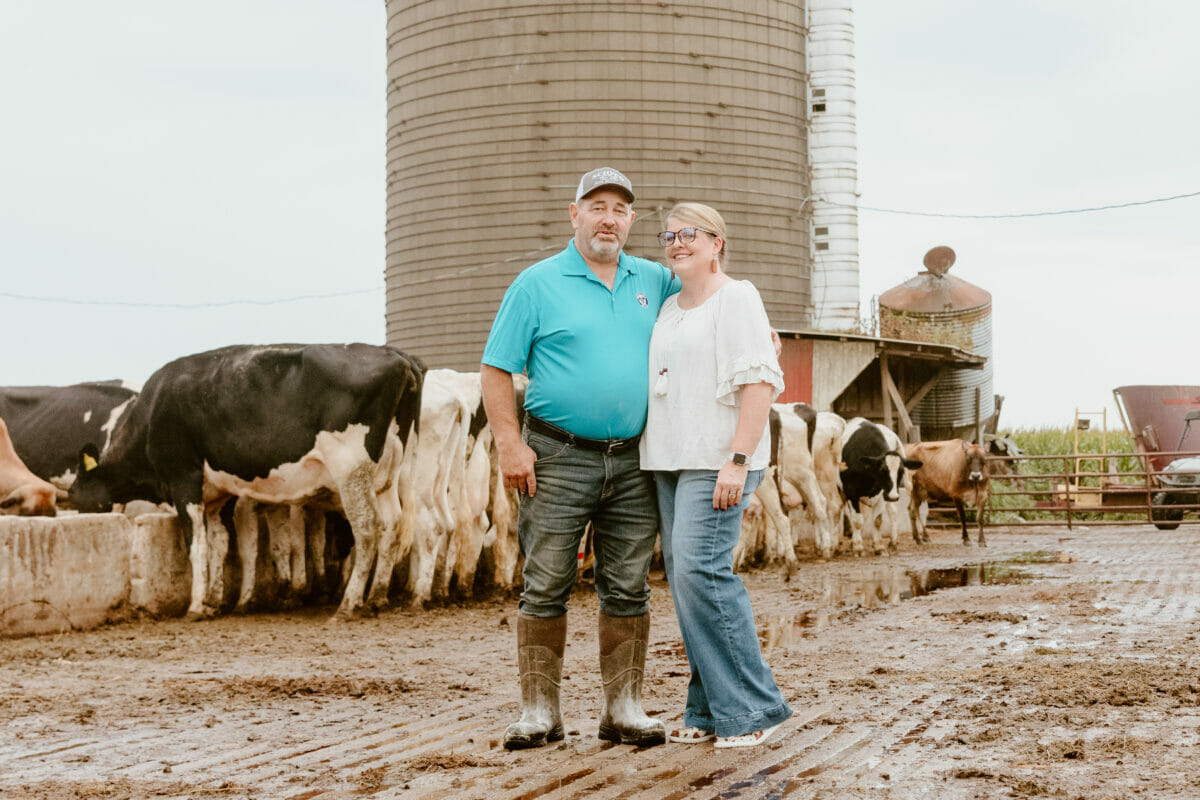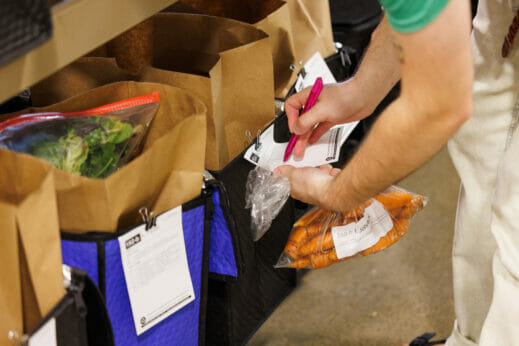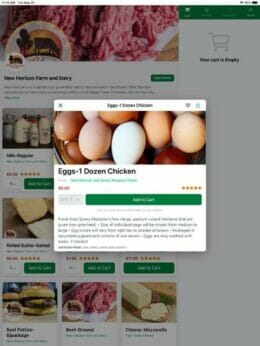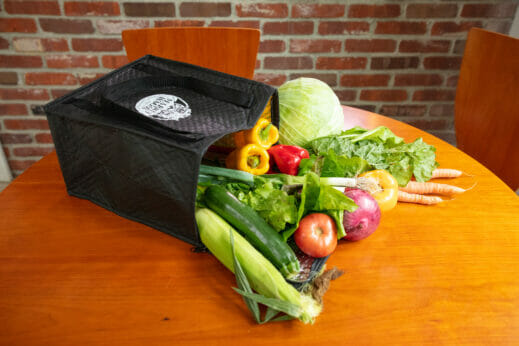The Farmers Market, Delivered
In the Midwest, a growing service brings local food to your doorstep, fortifying community farms in the process.
The Farmers Market, Delivered
In the Midwest, a growing service brings local food to your doorstep, fortifying community farms in the process.

Jackie and Donald Bickel of New Horizon Farm and Dairy.courtesy of Jackie Bickel.
In the age of DoorDash and Instacart, the concept of getting groceries delivered to your doorstep is not unfamiliar. But for the Bickel family, which runs New Horizon Farm and Dairy in New Vienna, Ohio, it proved to be life-changing.
Jackie and Donald Bickel inherited their dairy farm from Donald’s father, and they were raising their own kids in the dairy life. But, by 2018, Jackie and Donald were starting to talk about finding a way out. The Bickels sold their milk to a co-op and, economically, it wasn’t proving feasible.
“In 2018, milk prices were equivalent to what my father-in-law was receiving in the 1980s,” says Jackie Bickel.
And they weren’t the only ones—many nearby dairy farms in Ohio had closed up shop over the previous years after struggling against low prices.
Fortunately, the Bickels’ daughter, Maggie, had an idea. As part of a Future Farmers of America (FFA) project, she came up with a business plan for saving the farm that entailed making the switch to retail—selling milk directly to customers. If they did that, they could turn a profit and stay in business. But they’d need a few things: certification to sell, bottling equipment and a customer base.
They started selling their other products, such as beef and eggs, directly to consumers on a platform called Market Wagon. Market Wagon is a food delivery service for farm products. The Bickels knew that if they established a presence on the platform with their other items, they’d have customers waiting when they were ready to sell milk.
Maggie’s plan ended up winning an award in a national FFA entrepreneurship competition. And her parents agreed that it wasn’t just a good student project—it could actually work.
And it did.
Farm to front door
Market Wagon functions as an online farmers market, allowing the Bickels to tap into a group of consumers who want to buy directly from producers. In 2020, the Bickels started selling milk under the label Happy Cows Creamery. They offered standard, fresh milk, but they eventually also added fun flavors such as orange creamsicle, chocolate and strawberry. They also use Market Wagon to sell products such as soft cheeses and rolled butter.
“We started delivering the milk through Market Wagon and we haven’t looked back since then,” says Bickel. She adds that the dairy exit strategy they had once been contemplating is not even on the table anymore.
Here’s how it works: Farmers update the site with what they have for sale that week—fresh produce, dairy, meat, prepackaged meals and more. Customers shop across categories and vendors. They submit orders by a pre-set deadline, and farmers take their items to the Market Wagon hub in their area.
“For a Tuesday delivery, about one in the morning on Monday, we receive what’s called a ‘pick list’ from Market Wagon,” says Bickel. “It’s basically a list that is broken down by customer and it is also broken down by product. So we have a whole day to assemble the orders.” She drives the order in, disperses the items amongst the individual customer tote bags, and then heads back home.
Gig drivers then deliver the items to their destination. This process happens weekly or biweekly.

Grocery delivery is nothing new, but many produce delivery systems rely on national supply chains. Some, such as Farmhouse Delivery, offer a similar farm-to-doorstep model rooted in Texas agriculture, but they also offer certain items from out of state. As opposed to a typical grocery delivery service like Instacart, Market Wagon aims to keep things as local as they would be at an in-person farmers market while using its online marketplace to aggregate at a scale that is difficult through traditional methods.
“You would have to go to a farmers market every night to reach the number of people that you do through Market Wagon,” says Bickel.
Customers buy directly from producers, just like in a physical farmers market. But there are differences, too: Farmers only bring what they’ve already sold to the hub, instead of having to guess what they’ll sell that day.
“There is a pipeline from local farms and makers to consumers, but it’s narrow and twisty,” says Dan Brunner, co-founder and chief executive officer of Market Wagon. “And we’re here to widen that pipe.”
Farmer to consumer
Brunner says a lot of consumers long to know where their food is coming from. And while farmers markets allow you to look your grower in the eye, Market Wagon tries to keep personal touches as part of its technology, by allowing for direct communication and emails between consumers and farmers.
“As an online marketplace, technically, we don’t need to replicate that—we can’t totally replicate that,” says Brunner. “But enabling consumers to ask those questions and get answers is a central thing that we felt like we just couldn’t live without.”

But, in practice, the online community does sometimes spill over into the real world. Bickel says they have a loyal customer base now and often have their Market Wagon regulars come visit the dairy, see the baby calves and pick up items at their farm stand.
“Now more than ever, it is so imperative for us to have a voice with the consumer,” she says. “So, we love to talk with our customers and answer questions.”
Market Wagon does not ship anything—everything is kept within a tight radius of where it’s grown or raised or made.
“It’s really a unique business model, because, instead of building a national distribution pattern for the same products, we are actively trying to have a different supply chain in every single place we’re operating,” says Brunner.
Tom Hodson is a loyal customer of New Horizon Farm and Dairy’s Happy Cows Creamery through Market Wagon. He orders weekly and favors their eggs and baked goods. Hodson, descended from farmers and an advocate of eating locally, likes that Market Wagon allows him to know exactly where his food comes from and how it was grown.
“What you see on the screen is exactly what ends up getting delivered in your order,” says Hodson.
In his retirement, Hodson has also begun driving for Market Wagon twice a week, and he says he hears that same sentiment echoed by many of the customers he meets. They like buying directly from local farmers.

Pre-pandemic, Market Wagon existed in six markets in Indiana and Ohio. But the advent of COVID-19 highlighted the benefits of having groceries delivered to your door. Today, Market Wagon is in about 25 markets overall in the Midwest. Brunner foresees continual expansion into areas that could use a service like this—aimed at helping farmers thrive in their local markets.
This fortified resiliency is something that Bickel can attest to. Thanks to Maggie’s business plan and the resulting partnership with Market Wagon, her second-generation dairy farm appears to have a future as a third-generation dairy farm.
“We’re just trying to be as sustainable as possible with every resource that we have so that the farm is available for the next generation and the generation after that,” says Bickel.
Follow us
This work is licensed under a Creative Commons Attribution-NoDerivatives 4.0 International License.
Want to republish a Modern Farmer story?
We are happy for Modern Farmer stories to be shared, and encourage you to republish our articles for your audience. When doing so, we ask that you follow these guidelines:
Please credit us and our writers
For the author byline, please use “Author Name, Modern Farmer.” At the top of our stories, if on the web, please include this text and link: “This story was originally published by Modern Farmer.”
Please make sure to include a link back to either our home page or the article URL.
At the bottom of the story, please include the following text:
“Modern Farmer is a nonprofit initiative dedicated to raising awareness and catalyzing action at the intersection of food, agriculture, and society. Read more at <link>Modern Farmer</link>.”
Use our widget
We’d like to be able to track our stories, so we ask that if you republish our content, you do so using our widget (located on the left hand side of the article). The HTML code has a built-in tracker that tells us the data and domain where the story was published, as well as view counts.
Check the image requirements
It’s your responsibility to confirm you're licensed to republish images in our articles. Some images, such as those from commercial providers, don't allow their images to be republished without permission or payment. Copyright terms are generally listed in the image caption and attribution. You are welcome to omit our images or substitute with your own. Charts and interactive graphics follow the same rules.
Don’t change too much. Or, ask us first.
Articles must be republished in their entirety. It’s okay to change references to time (“today” to “yesterday”) or location (“Iowa City, IA” to “here”). But please keep everything else the same.
If you feel strongly that a more material edit needs to be made, get in touch with us at [email protected]. We’re happy to discuss it with the original author, but we must have prior approval for changes before publication.
Special cases
Extracts. You may run the first few lines or paragraphs of the article and then say: “Read the full article at Modern Farmer” with a link back to the original article.
Quotes. You may quote authors provided you include a link back to the article URL.
Translations. These require writer approval. To inquire about translation of a Modern Farmer article, contact us at [email protected]
Signed consent / copyright release forms. These are not required, provided you are following these guidelines.
Print. Articles can be republished in print under these same rules, with the exception that you do not need to include the links.
Tag us
When sharing the story on social media, please tag us using the following: - Twitter (@ModFarm) - Facebook (@ModernFarmerMedia) - Instagram (@modfarm)
Use our content respectfully
Modern Farmer is a nonprofit and as such we share our content for free and in good faith in order to reach new audiences. Respectfully,
No selling ads against our stories. It’s okay to put our stories on pages with ads.
Don’t republish our material wholesale, or automatically; you need to select stories to be republished individually.
You have no rights to sell, license, syndicate, or otherwise represent yourself as the authorized owner of our material to any third parties. This means that you cannot actively publish or submit our work for syndication to third party platforms or apps like Apple News or Google News. We understand that publishers cannot fully control when certain third parties automatically summarize or crawl content from publishers’ own sites.
Keep in touch
We want to hear from you if you love Modern Farmer content, have a collaboration idea, or anything else to share. As a nonprofit outlet, we work in service of our community and are always open to comments, feedback, and ideas. Contact us at [email protected].by Lena Beck, Modern Farmer
September 5, 2023
Modern Farmer Weekly
Solutions Hub
Innovations, ideas and inspiration. Actionable solutions for a resilient food system.
ExploreShare With Us
We want to hear from Modern Farmer readers who have thoughtful commentary, actionable solutions, or helpful ideas to share.
SubmitNecessary cookies are absolutely essential for the website to function properly. This category only includes cookies that ensures basic functionalities and security features of the website. These cookies do not store any personal information.
Any cookies that may not be particularly necessary for the website to function and are used specifically to collect user personal data via analytics, ads, other embedded contents are termed as non-necessary cookies.
This is so brilliant, such an obvious win/win scenario. I hope that many dairy farmers see this potential, as many like me would only ever buy milk from the source, never pasteurized/homogenized commercial milk.
Add to that locally grown produce and eggs? Who could resist that? I’ll be sharing this article with a Texas dairy I used to do business with before moving overseas.